Mobile Menu

Super User
FFRF Wins Montana Faith-based Challenge (October 26, 2004)
FFRF Wins First Faith-based Challenge (January 8, 2002)
Lord’s Prayer out, silence in
Another Pennsylvania school board has decided to drop prayer at board meetings after getting a letter from the Freedom From Religion Foundation.
The Octorara Area School Board in Atglen voted Sept. 17 to substitute a moment of silence for Christian prayer to open meetings.
FFRF Senior Staff Attorney Rebecca Markert had written an Aug. 17 letter to board President Lisa Bowman on behalf of a local complainant about the illegal recitation of the Lord's Prayer as an invocation. She reminded the board of numerous court rulings that said scheduled prayer at school board meetings is unconstitutional.
While the school hasn't formally notified FFRF of the change, according to a LancasterOnline story, the decision was made Monday. The story said Vice President Brian Norris told the board it must honor the law and that members could meet privately to prayer before the meeting.
The advice to pray privately didn't sit well with everyone, the news story said: "Three school board members, however, stepped down from the official table to protest the change. Board member John McCartney Jr. walked to the end of the table and knelt in prayer as the school board began its new tradition of a moment of silence."
Bowman was out of town but told the board in a letter: "The board should not put the district at [financial] risk. It could affect taxpayer and student programming."
The Grove City and Big Spring school boards also voted recently to stop praying before meetings after getting FFRF letters.
"Courts rightfully look with suspicion at imposition of religious ritual by public school boards," said FFRF Co-President Annie Laurie Gaylor. "Students who sit on boards or attend meetings shouldn't be subject to prayer they may not want to participate in or even witness."
The Anti-Defamation League had also protested the prayers.
Christian prayers dropped at UTK after FFRF complaint
As a result of a recent complaint by the Freedom From Religion Foundation, it appears sectarian prayer by Christian clergy over the loudspeaker at University of Tennessee-Knoxville football games will be dropped.
FFRF complained Sept. 13 to Chancellor Jimmy Cheek about the practice, in which an announcer asks all attendees to rise for the invocation, delivered by a Christian member of the clergy who invariably invokes Jesus Christ.
A letter from Cheek was faxed to FFRF mid-afternoon today, which indicated the University would conform its practice toChaudhuri v. State of Tennessee, a decision FFRF brought to the school’s attention, in which the 6th U.S. Circuit Court of Appeals held that nonsectarian prayer or a moment of silence at public universities is permissible.
“While we are pleased that UTK is moving in the right direction, the wisest policy is to drop prayer entirely,” said FFRF Co-President Annie Laurie Gaylor. “Students, alums and fans come to the games to watch players, not to recite prayers! Prayer hosted by a public university is unnecessary, embarrassing and divisive. It’s just plain bad manners to knowingly inflict prayer on those of us who are not religious and believe nothing fails like prayer.”
Religious ritual hosted and endorsed by a public university excludes the one in four young persons who is nonreligious, according to PEW, and more than 430,000 Tennessee adults who identify as nonreligious, ( American Religious Identification Survey 2008).
Gaylor said to ensure nonsectarianism UTK must cease inviting clergy, who are inextricably identified with their denomination, to lead prayer. Gaylor said as a sophomore at the University of Wisconsin-Madison she stopped graduation prayer there by pointing out it excludes many students, including foreign students, and unites church with a state-funded institution.
“I have no faith in prayer, but I do have faith in the power of secular students to mobilize and educate.”
FFRF, which is based in Madison, Wis., has more than 18,500 members, including 285 in Tennessee. FFRF has halted illegal prayer at many public schools in Tennessee, at high school graduations, sporting events and even in kindergarten. “We believe the same Establishment Clause precedent which protects public school students at lower levels from school-sponsored prayer should be applied to public university students,” she said.
Texas school halts football bible banners
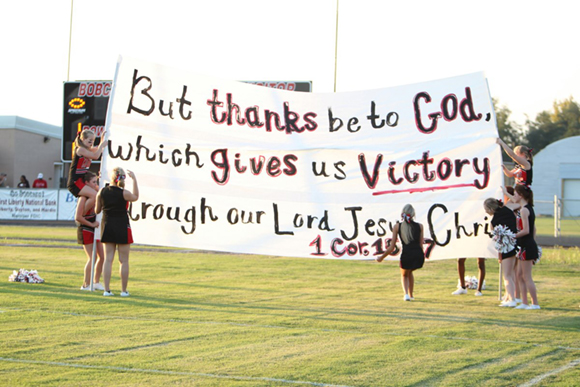
The Kountze High School Lions will no longer run through banners inscribed with religious messages before the start of football games in Kountze, Texas.
On Sept. 17, Stephanie Schmitt, Freedom From Religion Foundation staff attorney wrote Superintendent Kevin Weldon of the Kountze Independent School District:
"It is our information and understanding that Kountze High School cheerleaders regularly display religious banners that the football team runs through before athletic competitions. We understand that each week a different bible verse is displayed for all to observe. Enclosed please find photocopies of recent banners containing bible verses. You must take immediate action to stop these religious banners from being part of school-sponsored events. It is illegal for a public school to organize, sponsor or lead religious messages at school athletic events."
Schmitt cited a long list of court cases that have held such displays "constitute an unconstitutional government endorsement of religion. A reasonable Kountze student would certainly perceive the banners 'as stamped with [their] school’s approval.' "
While FFRF hasn't received an official response from the school district, a Sept. 18 story from KIII-TV in Corpus Christi said the banners are banned.
In a statement to KIII, Weldon said, "I commend [the cheerleaders] for what they stand for. But I called legal counsel and even though it's led by students, it should not be allowed to go on."
According to cheerleaders, the bible banner idea came from an instructional camp they attended. "Coaches preach devotionals before games. We wanted to show our support for our boys," Meagan Tantillo said.
Kountze [pronounced Coontz] has about 2,100 residents. According to Wikipedia, it was the first U.S. city with a Muslim mayor, African-American Charles Bilal, in 1991. It's also home to the world's only known pair of married armadillos, Hoover and Star, married June 10, 1995.
Tantillo said the squad made Christian signs for Tuesday's volleyball game against Warren High School. Warren High volleyball players gathered with Kountze players in prayer Tuesday, KIII reported.
FFRF, a state/church watchdog has about 18,500 members nationwide and more than 900 in Texas.
Defenders of the Constitution
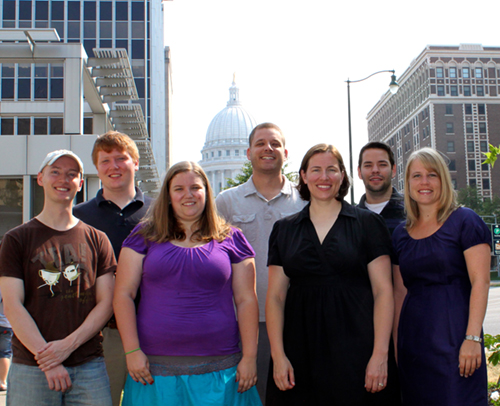
FFRF’s current legal team includes three interns who are first-year law students. From left are Ben Zich, Wake Forest University; J.J. Rolling, UW-Madison; and Maddy Ziegler, UW-Madison. To Maddy’s right are staff attorneys Andrew Seidel, Rebecca Markert, Patrick Elliott and Stephanie Schmitt.
Point, Counter-point?
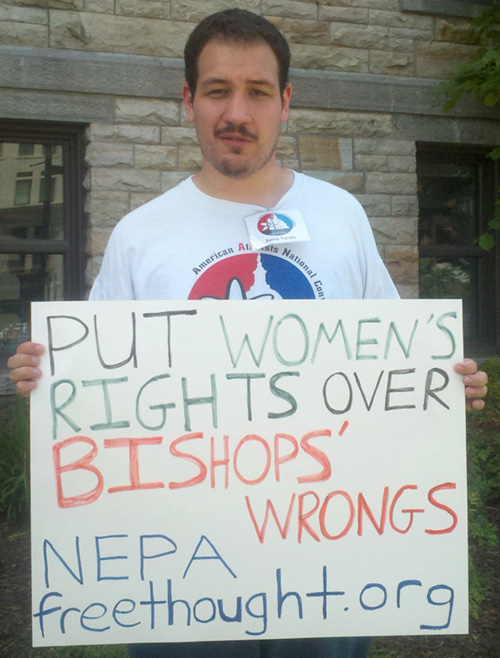
FFRF member Justin Vacula made good use of an FFRF Action Alert to show up as the sole protester at the June 8 Catholic rally at Courthouse Square in Scranton, Pa. Justin is also a plaintiff in FFRF’s suit challenging Pennsylvania declaring 2012 as the Year of the Bible. Interviewed at the rally by Go Lackawanna, he said, “The Constitution is explicitly godless. It’s a secular document. The government is anything but founded on religion. A lot of the founding fathers were deistic. These people are talking about religious freedom, but if they’re really for religious freedom, it wouldn’t be about their Christian beliefs.”
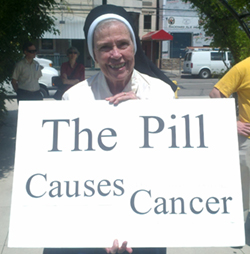
Could this be a women’s health expert disguised as a nun in Scranton, Pa.? (Justin Vacula photo)
FFRF STAFF AND VOLUNTEERS COUNTERPICKET IN MADISON
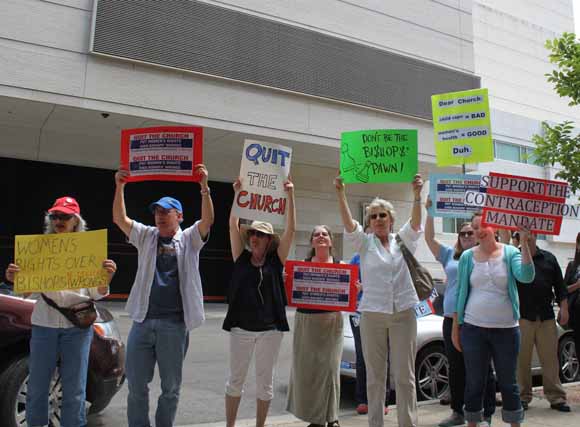
FFRF led a protest of the Fortnight of Freedom rally by the Catholic Church at the Federal Courthouse in Madison, Wis., on June 8. Bottom photo: Dan Barker being harangued. (Photos by Andrew Seidel)
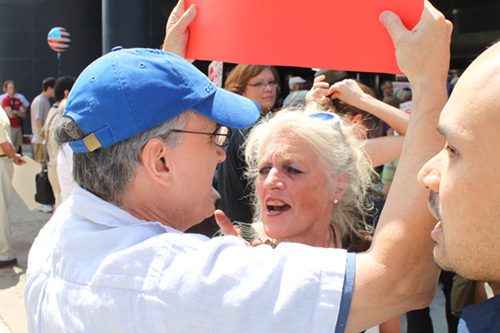
Not afraid to be a minority of one - Fairfid Caudle
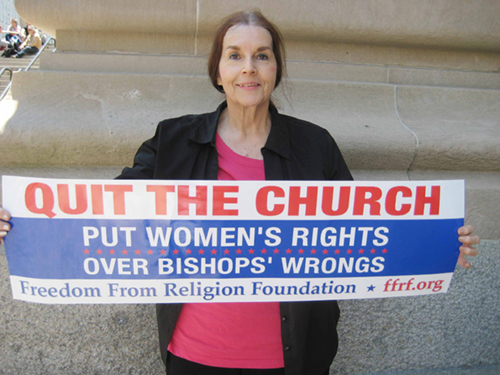
I am writing to tell you about the June 8 Catholic rally in New York City. I found out where it was being held from the email that FFRF sent, which included a banner to print out.
It was much too large to print on my home printer at home, so I called my local Staples early the next morning to find out if they could print it from an email forwarded to them. The result was a beautiful 1x3-foot laminated banner on heavy paper for a very reasonable cost, saying “Quit the Church — Put Women’s Rights Over Bishops’ Wrongs.”
The rally was held in front of Federal Hall at 26 Wall St. in Manhattan. A speaker told attendees the site was selected because it was where James Madison introduced the Bill of Rights in the First Congress. The First Amendment’s Establishment Clause forbids government from establishing religion in any way.
This was the crux of the Catholics’ argument, that their so-called “religious freedom” was trampled on by the Obama administration’s health care proposal, later altered in a compromise, to ensure that all women had access to reproductive health care services, particularly contraception, which is contrary to the Catholic point of view.
I was interviewed and photographed by a journalist from the Brooklyn Diocese. He said he was seeking “opposing voices” to balance coverage of the event. I gave permission to use this material.
I can’t tell you how many people came up to me and photographed the banner and said things such as that they would pray for me, etc. I got into discussions with several people and tried to articulate why I believed that what the Catholic Church called “religious freedom” was in reality an attempt to prevent any woman, including those who worked for a Catholic employer, from having access to contraceptives through their health insurance.
I argued in vain that no one was required to use contraception even if available in their health care program. Over and over people said that “contraception is easy to get and cheap, about $9 a month, and so women can get it if they want it. The Catholic Church just doesn’t want to pay for it.”
I was the only opposing voice there, as far as I could tell. There seemed to be 100 to 200 demonstrators, many with signs being handed out opposing “ObamaCare” and abortion and anything else that the Catholic Church opposes in this regard. There were prayers and hymns. Speakers included, among others, a Catholic female physician, a lawyer and Martin Luther King Jr.’s granddaughter (or so I was told).
The rally’s organization and the fervor of the onlookers was very sobering and made clear the enormous battle being waged as well as the reality of what we are up against.
I learned that it’s very difficult to be a minority of one in the face of such numbers. At least I still have my beautiful banner for another day!
Fairfid Caudle is a Lifetime Member from New York.
Celebrating 50th anniversary of landmark prayer case - Ellery Schempp
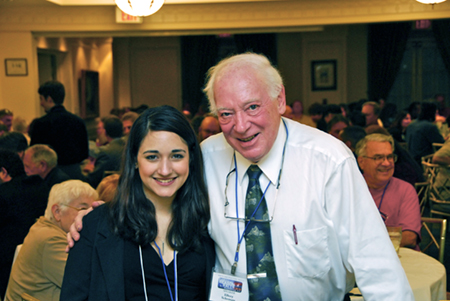
First Amendment heroes Jessica Ahlquist and Ellery Schempp celebrate the Reason Rally with FFRF. (Photo by Andrew Seidel)
June 25 was the 50th anniversary of the Engel decision. I write in remembrance and appreciation.
Engel v. Vitale was decided 7-1 on June 25, 1962, in a truly landmark Supreme Court case, regarding prayer in public schools. It was seminal to maintaining the “wall” of separation of church and state (as Roger Williams and Thomas Jefferson later described the principle).
Before Engel, the court had decided differently as to how much various governments could “accommodate” to prevailing religious sentiments, in the Everson (1947) and Zorach (1952) cases, and ducked the school prayer issue in Doremus (1952), conflicting with the McCollum case of 1948 as to how high the wall should be.
Engel came down squarely on maintaining a high wall. The decision was written by Hugo Black for the majority, concurred with by Douglas; the only dissent was from Potter Stewart. The decision went against the amicus arguments submitted by 22 state attorneys general and particularly against the attorney for the Archdiocese of New York.
This 50th anniversary is to celebrate the real people who made this history, and did so on behalf of their children. I honor Steven Engel, Lawrence Roth, Daniel Lichtenstein, Monroe Lerner, Lenore Lyons. (Engel and Lichtenstein were members of Jewish congregations; Lerner was a member of the Society for Ethical Culture; Lyons was a member of a Unitarian Church; the Roths were nonbelievers.)
And I honor the vital role that the New York ACLU played in this case and later ones, in support of First Amendment principles, and the attorneys who argued so eloquently and persuasively. (It has always seemed to me that successful Supreme Court cases should properly be known by the names of the attorneys, not the litigants.)
Engel was decided one year earlier than the Abington v. Schempp and Murray v. Curlett cases. I remember it well. I had just graduated from Tufts and was off to adventures in Greenland that summer. But my immediate reaction was that Engel paved the way, and we could not now lose Abington.
Indeed, Engel was an important precursor to the 1963 case of Abington v. Schempp, Murray v. Curlett and to many later cases: Epperson v. Arkansas (1968), Lemon v. Kurtzman (1971), Wallace v. Jaffree (1985), Stone v. Graham (1980), Lee v. Weisman (1992), Santa Fe School District v. Doe (2000) and especially Griswold v. Connecticut (1965) and Roe v. Wade (1973).
My family had no direct connection to the Engel/Roth families, but there is an odd coincidence. Steven Engel described how they moved to a community called Roslyn, N.Y. The Schempp family lived in Roslyn, a part of Abington Township, in Pennsylvania. We often got mail for Roslyn, N.Y., and I learned that Engel often got mail for us, especially after the Abington-Murray decision. Steve had hoped that the 1962 decision would be the end of it, but the 1963 decision reopened the nasty letters.
All the primary people are now gone. Steve died in 2008. In 2005, I met him in his apartment on Long Island, and we had a lovely conversation. His interests were far-ranging, but he acknowledged that separation of church and state were no longer central for him. He was sad that his friend Larry Roth had died. He recalled the hatred he faced during the court case, the swastikas scrawled in wet concrete in front of his house, the threats against his 7-year-old son (Roth’s children were ages 10 through 13) and the social ostracism the children faced in school. He was worried about whether his grandchildren would be “tainted.”
One thing to keep in mind: In 1959, leading up to 1962, there was no support for these families from groups such as American Humanists, Americans United, FFRF, etc. Some, such as FFRF, did not exist then. It is important to realize how isolated secularists were in 1962, and also in the shadow of the McCarthy era (“under God” being added in 1954). The ACLU was vital.
I think there are important things to incorporate from the Engel decision. Some memorable quotes from the opinion:
• “We think that, by using its public school system to encourage recitation of the Regents’ prayer, the State of New York has adopted a practice wholly inconsistent with the Establishment Clause. There can, of course, be no doubt that New York’s program of daily classroom invocation of God’s blessings as prescribed in the Regents’ prayer is a religious activity. It is a solemn avowal of divine faith and supplication for the blessings of the Almighty. The nature of such a prayer has always been religious, none of the respondents has denied this, and the trial court expressly so found.”
• “When the power, prestige and financial support of government is placed behind a particular religious belief, the indirect coercive pressure upon religious minorities to conform to the prevailing officially approved religion is plain. But the purposes underlying the Establishment Clause go much further than that. Its first and most immediate purpose rested on the belief that a union of government and religion tends to destroy government and to degrade religion.”
• “We think that the constitutional prohibition against laws respecting an establishment of religion must at least mean that, in this country, it is no part of the business of government to compose official prayers for any group of the American people to recite as a part of a religious program carried on by government.”
Prayer is no part of the business of government. Could there ever be a more succinct focus on the proper business of governments?
I celebrate the Engel decision on this 50th anniversary. Honors go to the Engel, Roth, Lichtenstein, Lerner and Lyons families, and to the ACLU.
Ellery Schempp, an FFRF Lifetime Member, protested bible reading and devotional prayers at his own high school, a protest that turned into the subsequent landmark Abington v. Schempp decision in 1963 by the U.S. Supreme Court. He is a retired scientist who often speaks about his involvement in the Schempp case and the importance of keeping religion out of government.
Hispanic American Freethinkers
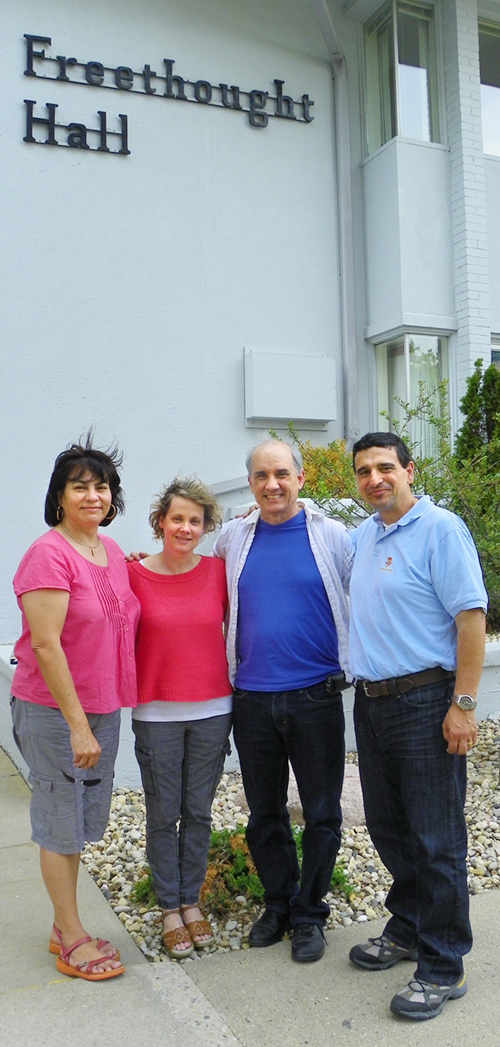
At left and right, respectively, are Lorena Rios, vice president, and David Tamayo, president, of Hispanic American Freethinkers, Reston, Va. They visited in June with Annie Laurie Gaylor and Dan Barker at FFRF’s offices in Madison, Wis. Tamayo founded the the group in 2011 as Librepensadores Washington. It’s online at hafree.org/.
Meet an Intern: Susan Lund
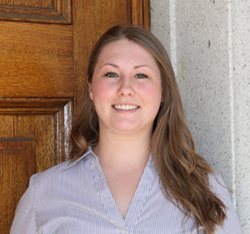 Susan Lund
Susan Lund
Name: Susan Lund.
Where and when I was born: Kenosha, Wis., May 13, 1987.
Family: I have a wonderfully supportive family made up of my parents, Barb and Steve, and my older sister, Libby.
Education: I earned my B.A. in linguistics from the University of Minnesota in 2009 and recently received my J.D. from the University of Wisconsin Law School.
My religious upbringing was: I was baptized and confirmed at a large Lutheran church, and my family later became members of a very small liberal Lutheran church.
How I came to work as an FFRF legal intern: I didn’t discover FFRF until law school, but I immediately applied when I learned about the organization and heard that they were hiring legal interns. I was finally able to work with FFRF during my third year of law school, and they allowed me to stay on as a law clerk since my graduation.
What I do here: I spend most of my time doing legal research and writing. This involves looking into allegations of state/church violations, finding case law to back up FFRF’s legal assertions, and sometimes writing memos to supervising FFRF attorneys informing them that I don’t think there is a legal basis to pursue a complaint. I get to spend some time talking to members about ongoing complaints and cases, which I especially enjoy.
What I like best about it: Besides growing professionally at FFRF, I’ve grown immensely on a personal level. Through exposure to enlightened coworkers, distressed complainants and freethought literature, I’ve developed more in-depth perspectives about my rejection of religion, religion’s role in society and the necessity of state/church separation.
Something funny that’s happened: I once emailed the Dawkins Foundation with a minor legal question so that I could better address a complaint. I got an email back from Richard Dawkins himself! This was while I was reading his book The God Delusion. I was starstruck.
My legal interests are: I aspire to practice public interest law in Wisconsin. I have a wide range of experience and hope to use it to help people who are impoverished and/or disenfranchised through a combination of direct legal work and big-picture policy work. Anyone hiring?
My legal heroes are: Whistleblowers and dissenters, courageous people who put so much at stake and often sacrifice greatly to provoke positive change.
These three words sum me up: I really want to blow this question off, but I’m going to attempt it: honest, passionate, analytical.
Things I like: Crafts, cooking, learning, sharing, live music, reading, exploring, social justice.
Things I smite: Paternalism, close-mindedness, arrogance.
Today’s most important legal issue is: Expansion of corporate personhood rights. Citizens United v. Federal Election Commission has played out in a number of scary ways that have huge implications for the democratic process. A recent Wisconsin example is the ridiculous amount of corporate money that entered Governor Walker’s recall election and, I believe, ultimately secured his victory.
This is relevant to state/church separation because the corporate personhood framework is being used to justify the Catholic bishops’ rejection of President Obama’s mandate for insurance to cover birth control. Employers can only object to health care provisions on religious grounds at the expense of the rights of its employees to access that health care. In essence, I believe that a system that entitles corporations to First Amendment rights drowns out human rights.
Student takes on school over prayer - Max Nielson
Early in the 2011-2012 school year at Irmo High School of Lexington Richland School District 5 in Columbia, S.C., faculty members distributed ballots to determine whether a majority of graduating seniors were in favor of holding a prayer at their graduation ceremony. The majority was in favor, to no one’s surprise.
District policy allows for that action, so long as the prayer is nonsectarian and nonproselytizing — which is to say, it can be explicitly Christian, so long as it makes no distinctions between Catholics and Baptists, for example. The spirit of inclusion stops there.
I wasn’t comfortable getting that ballot in my English class, but growing up as an atheist in South Carolina I was used to exposure to public prayer and the religious status quo. After becoming familiar with Harrison Hopkins’ story — a student activist who, with the help of FFRF, reversed his school district’s stance on a majoritarian-governed graduation prayer in South Carolina last year — I took immediate action. Timing was critical, as I was inspired to take action just 10 days before the graduation ceremony.
FFRF moved swiftly, issuing the appropriate letters of notice and securing a spectacular lawyer for local counsel. I met with the district superintendent to discuss the issue to attempt to reach a resolution. He delivered his decision in a follow-up email after we met, which ironically states, “I do not believe that Freedom of Religion should be interpreted as requiring Freedom from Religion within the public schools.”
As such, the prayer and lawsuit proceeded. I recruited two younger students from Irmo to join the suit to ensure that it will survive despite my graduation and departure from District 5.
This event led to my realization that I have a true passion for secular activism, and I plan to tenaciously pursue involvement with the College of Charleston’s chapter of the Secular Student Alliance throughout my next four years of education.
Matthew “Max” Nielson, 18, is the principal plaintiff in FFRF’s federal lawsuit challenging illegal graduation prayer at his high school. Two younger students have sign on as plaintiffs.
Max is an honors and international baccalaureate candidate. He’s training for a black belt in American freestyle karate this summer. He’s an Eagle Scout who is religiously unaffiliated.
Clergy Project: ‘The truth set me free’ - Joshua Everett
This article appeared June 10 in the La Crosse Tribune as part of an ongoing series by Wisconsin freethinkers. It’s reprinted with permission of the author.
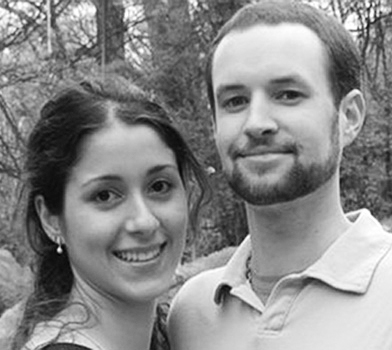
I am an ordained, fundamentalist evangelical Christian minister, and an atheist. It might seem counterintuitive to read such a sentence, but a surprising number of ministers are rejecting religious belief. None of us became ministers expecting to leave religion behind; we were authentic, strong, sincere, faithful clergy and practitioners of our faiths.
Changing our minds about religion does not make us inherently bad or immoral people, uncharitable, dishonest, hostile, lacking in knowledge or common sense, deviants or any of the other epithets frequently used to malign nonbelievers.
The Clergy Project (TCP) is an organization that provides a support community for nonbelieving (atheist and agnostic) clergy and former clergy from all religions and denominations around the world. The organization, started in March 2011, currently has more than 300 members and receives over 40 applications each month. Members go through an extensive screening process to ensure that prospective members are actually nonbelievers and are clergy or former clergy.
Members are classified as either “active” (active clergy) or “alumni” (former clergy). The organization is not meant to proselytize or change the beliefs of active clergy, but to provide them with a support group as they attempt to trade their religious careers for secular careers.
Many of us accumulate a great deal of debt attempting to retrain ourselves. Many work in minimum-wage jobs the rest of their lives. A great number lose their jobs and families. Some lose everything and are homeless now.
Do we complain? No, I’ve never heard a single complaint from any member of TCP. In fact, most of us accept the consequences of our misguided religiosity without bitterness. We are content to have broken free in some manner or other.
The idea of active clergy who no longer have religious beliefs might strike you as dishonest. However, one must consider all of the difficulties of their situations before passing judgment, as well as remember that such major changes in life are the result of lengthy processes rather than snap decisions. Leaving one’s religion can result in varying degrees of consequences for even nonclergy, but the consequences are much greater for clergy. Most have families to support, so their principal concern is finding employment.
Another important concern is the loss of spouses, friends and family who might react negatively or hostilely to such drastic changes in religious belief. Fear of losing my friends and family and of possible hostile reactions in the community were major concerns for me. Indeed, when discussing my background, I am frequently attacked and prejudged by believers who seem to consider my change of mind to be an attack on their religious identity.
Starting from scratch
Clergy Project members are extremely concerned with maintaining their integrity and being honest with their families and congregations. They also feel responsible for trying to maintain the unity of their families and providing for their needs. Furthermore, most clergy have seminary degrees that do not apply to secular careers. Thus, career changes often entail starting over completely with their education, job training and professional skills.
Few days go by that we are not depressed at least to some extent due to our previous lives. Certainly we were all sincere in our desire to help people above all, and many of us, myself included, never participated in preaching intolerance or hate. I cannot with good conscience say that my intentions justify my misguided proselytizing and preaching. These are regrets we all bear, along with the regret of so many wasted years of our own short lives. The conflictive responsibilities of maintaining one’s integrity and providing for one’s family, combined with the stress of changing one’s worldview and beliefs, can lead to a great deal of emotional turmoil.
TCP offers a support network that can provide encouragement, strength, and experienced counsel to active clergy going through such traumatic processes. I became involved in the project in the fall of 2011 as an alumnus (several years after I left my career as a minister) in order to help active members make the transition more smoothly.
Members of my family have been evangelical Christian ministers for many generations, which is a legacy I was all too happy to share. I served as a minister in various volunteer and staff positions for several years before and after my ordination, including significant amounts of mission work in Central America. Throughout the majority of these years, I never questioned my beliefs whatsoever. In fact, I loved church the whole time I was involved, and always remember my experiences fondly.
My decision was not about the comfort and community offered by religion; I simply chose to follow the facts wherever they would lead me. I was encouraged in this task by several verses from the bible which encourage searching for the truth (John 8:32, Ephesians 4:25, 1 Thessalonians 5:21). We must acknowledge the courage that these clergy demonstrate by willingly following their commitment to the truth despite the probability of personal loss.
Whenever I discuss my background, the most common question everyone has is, “What caused you to change your mind about religion?” Like most clergy involved in TCP, I did not become a nonbeliever due to personal tragedy, horrible experiences with religion, ignorance of scriptures or doctrine, or a desire to be free of religious restrictions. An overwhelming number of clergy reject religion as a result of many years of serious religious study. We reject religion for intellectual rather than emotional reasons.
The passion for ethics and truth that lead us into our occupations as clergy also lead us out of religion. When I became a minister, I committed to the truth wherever that might lead. Through my religious studies, I came to know the truth, and the truth set me free.
Though originally from Texas and Louisiana, I now teach Spanish, serve as the technology guru and direct the tutoring program for the language department at a university in Wisconsin. Outside of work, I enjoy Web design and programming, as well as blogging about atheist issues in English, Spanish and Portuguese. I like to think that the language skills I learned for mission work are put to better use now.
Joshua Everett is a member of the La Crosse Area Freethought Society and the Clergy Project, co-founded by FFRF’s Dan Barker.
A Christian musician’s path to disbelief - Joseph Taylor
Joseph Taylor gave this speech (edited for print and space) at FFRF’s national convention Oct. 8 in Hartford, Conn.
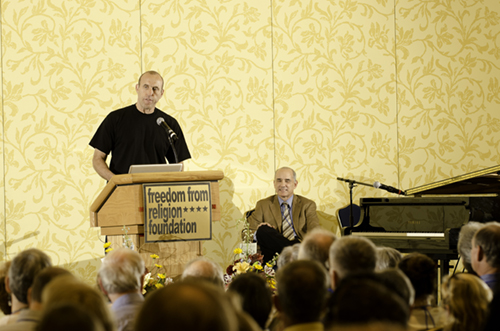
I first got in touch with Dan Barker after I was browsing through the atheist books at Barnes and Noble. I saw this book Godless, which is quite a provocative title. I started reading it right there in the aisle and saw his involvement in Christian music. It even mentioned southern California. I said, “I’ve got to get in touch with this guy.” So I dashed off an email to him and he was kind enough to respond.
I teach the history of rock music at James Madison [University, Harrisonburg, Va.] We have 306 students every semester. This is the first time I’ve addressed a group that’s made up almost completely of unbelievers, and I’m tempted to say you’re all going to hell. On the other hand it makes me think of that bumper sticker, “Where are we going and why are we in this handbasket?” All right, well, let’s detail my own trip to hell.
I’m an artist. I’m not a scientist and I’m not a philosopher. This is an important distinction to make, an obvious one, but I was listening to the speakers last night, and many of the books that we all read, we depend on science and philosophy. We even depend to some degree on theologians to find out what the other side, if you want to call it that, is thinking.
Art on the other hand is a little bit different. We depend on the raw material from science and philosophy and hopefully bring some interpretive meaning to it. How does this impact my world? How am I to think about this? How can I put this into some kind of meaningful context? The arts bring meaning to that.
It’s also meaningful to point out that laws, but also facts, as critically important as both are, are often not enough to change our hearts. Absolutely essential, but can they change our hearts? If you look at the history of the civil rights movement, we had the desegregation laws, but it was when at concerts where black artists were playing and they had a rope down the middle of the audience — one side for the blacks, one side for the whites — and they started dancing and the rope came down, they started dancing with each other, which was absolutely scandalous.
That’s what it takes to change people’s hearts. Laws and facts are essential, but it’s the arts that really appeal to people’s hearts.
A believing brain
Let me start by referencing Dr. Shermer’s book, The Believing Brain. I always had a sense of God in my life from my earliest memories. It might have had something to do with the fact that my mother was an Italian Catholic whose mother was one of 19 children — between 16 and 19, we’re not sure, because they lost some in childbirth.
The youngest of those, Uncle Fred, had nine children himself. He was a devoutly Catholic, Italian guy in Philadelphia who made his family sit through one decade of the rosary every night before dinner. We were threatened, “If you don’t behave, you’re going to go to Uncle Fred’s for the weekend.” Holy shit, anything but that, please.
I remember a dream that I had when I couldn’t have been older than 5. I wrote and recorded a song about this: I was in the Vatican and I was dead, in a line of dead souls waiting to ascend a staircase to heaven. The pope was walking around and he could see us, but nobody else could, so the pope knew that we were there but nobody else did. What vivid imagery.
In first grade, a year later, a nun told us a story of a statue of the baby Jesus in the church coming to life and playing with two lonely children. This is the honest truth. I went to the church after school that day and knelt down in front of the altar because we had a statue of the baby Jesus in our church. I prayed that the statue would come to life and play with me. I was 6. Of course, we know the ending to that story.
I wanted God to be real. I used to watch “Bernadette of Lourdes,” “Ben-Hur,” “The Greatest Story Ever Told,” all these religious movies, and the music was so moving. They know how to do this to appeal to our deepest, most powerful places. I wished so hard I could have lived back then. I could have walked with Jesus, I could have seen him walk on the water, I could have seen him rise from the dead, or not. So from my oldest memories, I had a believing brain.
Of course we have to adjust at some point, we have to get over it, because it just doesn’t happen. In high school I left the church altogether. God was not present in my world; that’s just the way it was.
Three ‘Broken’ records
Shortly after I was invited to be in a band in high school, my uncle told me about this church in Costa Mesa, Calif., Calvary Chapel, that had Christian rock bands. Maybe I’d like to go and check them out? I went with him. It was a very large church that spearheaded much of the Jesus movement in the late ’60s or early ’70s. The young people were coming in barefoot or with sandals and jeans and shorts. They sang and were very much animated and energized by their faith.
I really wanted God to be real in my life, and boy, God sure seemed real to these people in their lives. So there I was, and I went forward at an altar call and immediately launched my mission from God.
The band that I was in [Undercover] started playing Christian music and writing our own songs. I didn’t grow up in the Protestant sociology that Dan came from; I was Catholic. We didn’t have a lot of the same restraints, but he’s absolutely right. The church and Christian rock was an oxymoron in some of those Protestant evangelical circles.
No sooner had they started to get used to someone coming in with long hair and an acoustic guitar rather than playing piano or an organ, and here we came with tattoos and mohawks and ripped jeans and boots and spikes and leathers and earrings and whatnot. I didn’t care what they thought. We were on a mission from God. We were playing nightclubs and college campuses and high schools and wanted to communicate through the music we knew what we thought we’d found.
We were approached by Maranatha Music because we had developed a little bit of a following. They asked us to record our first record. Maranatha was a parachurch organization. It was the record company owned by Calvary Chapel, the church that started a lot of the Jesus movement stuff, and as such they were famous for their “praise” albums.
Does anyone have those early praise albums? So you know what I’m talking about. It’s very mild, stuff to be played in church. Then they started a label called A&S for edgier music. A&S’ claim to fame is Sam Phillips. She’s a great artist, writes for television shows and was married to T-Bone Burnett, who has produced all kinds of movie music and records.
We built quite a following. There were a lot of bands that were spinoffs of what we were doing. We’re talking about rather extreme music, loud alternative music, punk rock, heavy metal. And the churches are going, well, what are we going to do with this? So Maranatha Music started yet another label called Broken Records and hired me to be a staff producer to mentor new groups.
This is from a promotional postcard: “Broken Records is an unprovoked attack on complacency. Broken Records is a clear, uncompromised call to the unsaved, unchurched and culturally disenfranchised within the body of Christ. Broken Records is radical restructuring of relationships between music and the church, between artists and audience, between business and labor. Broken Records is people over product, vision over vinyl. Broken Records is surrendered and dependent.” (Whoo. Love that one.) “Broken Records is armed and dangerous. Broken Records is a militant response to the trickle-down theory of evangelism.”
We released three records on that label. Our group’s logo was designed by Rick Griffin, a quintessential San Francisco artist who did Grateful Dead record covers, concerts for the Fillmore, Janice Joplin, Jimi Hendrix. This highlights our militant approach, “Onward, Christian Soldier.”
We did 250 dates a year all over North America and Europe, giving altar calls. The lights come down, the music comes up, you know the scriptures to say. It’s powerful stuff that you can use to bring people forward.
Christian branding
Reality often interferes with the best-laid plans. Lots of us go through divorce, 52% statistically. Of course, according to the Barnard group, atheists do better than the religious, so we’re probably less than 52%. So, congratulations.
But there I was then, a mentor surrounded by kids and oh, by the way, I’m going through a divorce now. It wasn’t just how do you deal with the divorce and the scandalous aspect of it, but the bigger question of why was my faith so powerless to do anything about teaching me what it was like to be married, to do anything about building the kind of character I needed to be a successful human being in a functioning world?
I had four beautiful kids, so that was my question, and as a result I wrote this album, “Branded.”
“Branded” had multiple meanings for me: Number one, I was branded in the sense that once you go through divorce in the Christian church, your star’s dimmed a little bit. But for me the imagery of the tattoo [of crosses on the album cover] was more important. Yes, I wanted to keep my faith; I was branding myself a Christian.
So we released this record where I documented the process of my divorce and what it was like to deal with the failure of my faith. I don’t mean to blame my faith, I assume full responsibility for myself, but really, the faith I was practicing, the things I believed in were completely powerless in any meaningful way in my life. We released the record, and it was powerful, 25 years ago this year. The record label did a rerelease. Right now there’s a list coming out where it’s in the top 50 Christian music records of all time.
In 1987 I bought Broken Records and changed the name to Brainstorm Artists. We produced well over 100 records, won all those awards. We shifted the focus because it was obvious to me that evangelicalism didn’t work. I was still holding on to my faith, but we shifted from a more militant view to a more art-based form of Christian music.
I held that label for a number of years and sold it eventually. I was tired of the hypocrisy. I saw other artists whose lives were ruined. Alcoholism, drug addiction, all kinds of messes, and I don’t mean to say that this is caused by religion, but I’ll tell you what I do believe, that it’s perpetuated because they stay in religion and there is no power there, there just is nothing. Of course you know this, I’m preaching to the choir, if there ever was such a concept.
We played scattered concerts, Chicago in 2000 and various others, but by and large I was becoming unraveled. I stayed in a period of believing in the fundamentals of Christianity. We were doing Christian music, playing the same songs, I could deliver a sermon. I don’t feel like I was hypocritical because I did believe the things that I was saying, but the rain falls on the just and the unjust alike, and I can’t promise anybody anything. There’s no there there, so I can’t promise you anything. All I can say is you need to believe in Jesus. Now here’s this song, you know.
Date an atheist?
In 2007 I took my job at James Madison University, and in 2008 I knew not a soul there. So I’m going to have confession here, excuse me. I signed up for a dating website just to meet people. I came into contact with a scientist and she was an atheist, the first atheist I’d met.
She said the first time we talked that she had Googled me: “I want you to know that if you’re going to try to convert me or if you think I’m going to hell, I’m not going to go out with you.”
It got me to thinking about what I believed. There’s a book by Rob Bell [founding pastor of Mars Hill Bible Church in Grand Rapids, Mich.]. He’s trying to work his way through the idea that hell is still a possible coherent idea. It’s simply not, especially if you want to postulate the existence of an all-loving God. It’s ridiculous, and I knew that.
So I constructed my own idea of what hell must be like, Of course I couldn’t abandon the idea — there it is in scripture. But one day I woke up and said, “I just don’t believe any of it. It’s all bullshit. I’ve been making shit up my whole life.”
Keith Parsons, a wonderful philosopher, had this to say about two scholars arguing for the existence of hell: “To refuse to believe in hell is to measure God’s thoughts by ours.” You’ve all heard this argument. God’s ways are higher than our ways, and we don’t know the mind of God.
Parsons: “Allow me at once to plead guilty to measuring God’s thoughts by my own. As I see it. I have no other choice. If my intellect and my deepest moral convictions tell me that hell is a monstrous dogma unworthy of belief by decent human beings, then I can think of no greater sin than to accept such a doctrine. It is a sad but edifying spectacle to see how intelligent defenders of the indefensible tie themselves in ethical and conceptual knots.”
I had to wake up and say, “You know what? That’s exactly what I’ve done. I’ve tied myself in knots trying to rationalize and justify things that cannot be rationalized or justified. So I said to the woman, “Yeah, we can go out.”
But we didn’t. We had a couple of nice chats and she told me that she thought I had a responsibility to come out and to announce this to my Christian audience. I disagreed. I said, “I couldn’t possibly care less. It’s been a number of years since I’ve been out of Christian music anyway, and my phone’s not exactly ringing off the hook with people who are overly concerned with the well-being of my eternal soul. So I’m just inclined to say screw the whole thing and let them, let’s just let the world get on with itself.”
Thinking things through
Once I acknowledged to myself that I was an unbeliever, I began reading everything I could get my hands on, all the Dawkins and Hitchens, Dennett and Sam Harris. I picked up Dan’s book Godless and just soaked it all in. But the problem was this, and I would submit to you that this is a fundamental problem, that I had no context for a life away from the idea of God.
So many hands went up when I asked how many of you are lifelong atheists. You get it. I sat at breakfast with someone this morning who said they’re second-generation atheist. You’re very lucky. Me, Italian Catholic, two first holy communions for crying out loud.
How do you think about reality? It wasn’t enough to offer me facts. It’s like, all right, how do I construct a worldview out of this?
Very shortly after, this book came out: God’s Not Dead (And Neither Are We). I have a chapter in the book [subtitled The story of Christian alternative rock’s pioneers then and now, as told by the artists themselves]. It was an interview done before I acknowledged that I didn’t believe any of it. I was asked to help promote the book on Facebook. I had not done Facebook, but I said OK. I had no idea what I was getting into.
Next thing I know I’ve got hundreds and hundreds of people coming on board. I’m faced with a crisis. I’ve got to be honest with these people, or not. That was an easy choice to make. I was not willing to be untruthful about where I was, what I believed.
My fear was that I wouldn’t have all the right answers. If someone asked me a question about the beginning of the universe, the big bang theory. Remember, I’m not a scientist, I’m not a philosopher, I’m an artist.
What I didn’t know is that I don’t need the right answers; all I need is the right questions. I would submit to you that that’s one way to approach this. It’s not all about answers. It’s about questions, and so the conversation started, and it started in earnest.
‘Ojo Uncovered’
Down the Line magazine in July of 2010 is where I came out altogether, in “Ojo Uncovered.” [He was known as Joey “Ojo” Taylor.] They asked me directly — we’ve heard on Facebook what you’re saying about your beliefs. What are your beliefs? I laid it all out. What do you think about the Christian faith? And I laid it all out.
The reactions have been all over the place. I haven’t had any death threats yet, although some of my friends have warned me that I should get protection sometimes. That seems so extreme, yet I know there are people that do get these kind of threats, and I’m wary about them.
I’ve heard things like, “Oh you’re a fraud, you never were a believer, you never were sincere to begin with, you were probably just in Christian music for the money.” But there’s more interest in what I’m doing now than there was when I was Christian musician. Tons of questions.
What I hear more than anything is how tragic it is. I see blog posts titled “Ojo Taylor, one of our heroes, has fallen.” How saddened they are by it. “He’s lost his faith.”
No, I didn’t lose my faith; my faith died a thousand deaths. From the minute I walked down the altar, things didn’t make sense and it has died a thousand deaths over the years. I had no context for what it was like to live outside of that. I do now.
Many of you maybe are not involved actively with a lot of ultra-religious people, but I am regularly. Every single day, dozens of posts come to my blog, to my Facebook page.
Some are very kind and ask questions sincerely, intellectually curious, others not so much. I would submit that you have about as much chance of changing someone’s religion with debate and confrontation and argument as you do changing their political affiliation. Anyone have parents that sit in front of Fox News all day long? You know what I’m talking about. Maybe your parents sit in front of MSNBC and you roll your eyes, too, I don’t mean that to be a partisan statement, but we cannot change people’s minds just by argument. We’ve all got our arguments.
Life without faith
I’ve learned that people need a context for seeing a life without God. I think this is where the arts become critically important: The T-shirt that says “This is what an atheist looks like.” The billboards that are going up all over the country, “Good without god.” The billboards that Freedom From Religion Foundation are doing that many of you have submitted that, “Yes, I’m an atheist, here’s what I look like. I have a family, I have a job, responsible, taxpaying citizen. I don’t eat babies, I don’t have satanic sex orgies.”
It’s very difficult for anyone to abandon their faith without an idea of life without it. We can’t just argue, we can’t just throw facts around, we need more than that, as critically important as that is. In this way the arts can be extremely effective. We appeal to feelings and emotions, that’s true. It’s not always necessarily bad. If I pay $75 to go see someone in a concert and I’m not moved, I’m pissed off. I kind of want my money back. I want you to take me on a journey.
We depend on metaphor, irony, paradox, all these things, asking questions. Stay free, that’s my message to myself. I’m not interested in replacing one fundamentalism with another. Maybe some of you will disagree with what I have to say and maybe I’ll disagree with you. That’s the beauty about this. We don’t have any kind of doctrinal purity to subscribe to.
I hear this all the time: “Atheism is nothing but a religion.” Well, atheism is a religion like the “off” switch on a television is a channel. I don’t have a purity doctrine because there isn’t one. I don’t believe, and neither do you, OK? Some of us are Republicans and some of us are Democrats and some of us are libertarians and independents and whatever else.
When I wrote the article in Down the Line, I was inclined to let the religious be. Coexist, what a wonderful world that would be, we all just coexist. You don’t put your religion on me and I won’t put my disbelief on you, but it just doesn’t work that way, does it?
The other day I posted about coming here and boy, the vitriol from the Christians about the Freedom From Religion Foundation. One guy had done some Googling and found this article by Dennis Prager about an FFRF lawsuit against a nativity scene in front of a government building. Prager got his knickers in a twist and said the people at FFRF don’t know beauty. “They’re atheists, and atheists don’t know beauty.” That was my friend posting on my Facebook wall.
I asked what in the world was he talking about? He said the nativity scene is beautiful, what don’t you get?
I said look, take away the fuzzy sheep and the donkeys, you ass, and what are you left with? The cute baby Jesus. What’s beautiful about a god who is so offended by us acting the way he made us act — so offended that he needs human blood sacrifice of his son to mollify him? That’s beautiful?
Yes, the mythology might be strong, but, I’m sorry, it’s just not a beautiful statement to me at all. This is why religion is rarely harmless and why we need groups like the Freedom From Religion Foundation. It’s important for us to support them and advocate on their behalf and get involved.
Love is the umbrella over all of humanity. Love is what unites us; to me that’s the pinnacle of the human experience. Religion would have it the other way around: doctrine is most important, and their version of doctrine is more important than anything.
So we must aggressively — again, I’m speaking to myself — counter any attempt by religion to co-opt or assimilate our own love or any of the other human experiences, the fullness of the human experience — because it doesn’t belong in the realm of religion. It’s the big umbrella under which religion unfortunately resides.
To quote the Beatles, “In the end the love you take is equal to the love you make.” For me it’s about music, freethought and “lovism,” that’s what it says on my blog.
Love, the highest calling that we have. For me, that is most deeply expressed in music. Thank you very much for listening today.
Joseph Taylor teaches the history of rock, artist management, songwriting, marketing of recorded music and entrepreneurship in the music industry at James Madison University in Harrisonburg, Va. He blogs at ojotaylor.wordpress.com/tag/agnosticism/.
Ehrenreich accepts Emperor, rejects religion’s shackles - Barbara Ehrenreich
Barbara Ehrenreich (atheist, feminist, author, essayist and columnist) gave this speech March 24 in acceptance of her Emperor Has No Clothes Award in Washington at FFRF’s post-Reason Rally gala dinner.
Wow, I have to hold it, OK? I think it’s anatomically correct, but there’s a fig leaf in case you’re curious. Thank you very much, Dan. I will be very proud of it as will my family.
It is an honor to be with you. I’m in so many settings where I am the only atheist, the only “out” atheist, and I kind of feel that whatever the subject is, I have got to get that in there somewhere. You know, particularly the idea that you cannot be moral, you cannot be socially involved or socially conscious unless you are with the “God Party.”
I thought I would go a little against the grain here with some dogmatic statements about God. Yes, I am going to talk about God. What qualifies me to do that? Well, I have read a lot of theology, surprisingly perhaps, a lot of the history of religion, and believe me this is very relevant, a huge amount of science fiction, which I am going to draw on. Plus since I have this award, I can now say anything, I think, I am entitled.
I wish we had the people picketing outside [Westboro Baptists] in here, because they seem to be experts, too. This is Saturday night, and I don’t know what all of you are planning to do for the rest of it, but I do know absolutely for sure that God does not care if you do it with contraceptives. He or she does not care if you do it with a person of the same sex as yourself, whether you are married or single, any of the rest of that.
In fact, if you search the bible, you will find no reference to birth control or gay marriage, and you will not find a word, strangely, about stem cell research. I have searched.
Let me say a little bit about abortion, since that is a major issue with the godly now. As a former biologist, I will say that if God cared about each fertilized human egg, he would not let an estimated 60% of them die each month before they get implanted in the uterus, flushed out with the menstrual flow.
They are killed by the deity him or herself, or at least not cared for by the deity. Unless of course you want to argue — I am always afraid to bring up this plain biological fact because someone is going to say, “Oh my god, we have to provide Christian burials for tampons” — it will get harder to dispose of a tampon than a Quran.
Where did the idea ever come from that God is called pro-life? I mean the people that say that, I am just saying pro-life here without any judgment attached to it. What about tsunamis?
What would Jesus eat?
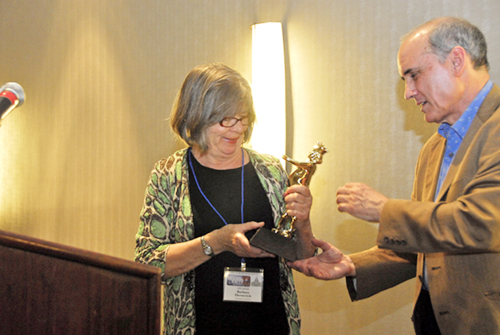
This is equally dogmatic: God does not care about your weight-loss issues. You may wonder why I bring that up, but if you Google Jesus and quote weight loss, you will get millions of entries. A lot of people are convinced that Jesus wants them to be thin and that he has the best diet plan on the market.
You can contribute this to divine revelation on my part, but God does not care if you lose that last five pounds. Nor, sadly, does he seem to care if we are nice to each other, whether we are kind and we share, if we are nonviolent, whether we care for each other.
Those are human values, they do not come from some divine or extra-human source, and there are no rewards in the afterlife for those who put them into practice. In fact, if by some fluke or miscarriage of divine justice, I am ever offered a place in heaven, I will have to turn it down. Not only because my friends and family will be in the other place. Face it, something that seems very clear to me about the teachings of Jesus, whom I greatly admire, is that if you were offered a place in heaven that you would have to turn it down and give it to some poor sinner so that he or she does not have to spend eternity in hell, that would be the “Christian” thing to do.
I am just putting them on notice about that in case I should ever be put into that position. Now as for God’s particular interest in us or agenda for us in general, whatever issue you look at, sex or social morality, all the evidence points in one direction. He is just not that into us.
You may be wondering why talk about “God” at all. This is a Freedom From Religion celebration, not a theology lecture. If God is what they say — perfectly good and loving and all-powerful — then of course he doesn’t exist. It is impossible, as so many have pointed out over the centuries, for some deity to be both all-powerful and all-good. As Nietzsche or Stendhal said (it’s attributed to both), “God’s only excuse is that he doesn’t exist.”
There is no way to reconcile all that power and goodness. We won that debate. Long before Dawkins and the New Atheists came along, we won that, it’s over. Ever hear of the great American nonbelievers like Robert Ingersoll, anybody? Oh wow, I don’t often find many people who know.
Imagine cosmic ‘others’
Now I am going to ask you to get a little bit more out of your comfort zone and think in more general terms. Forget about the familiar monotheistic patriarchal notion of God. Think instead about the possibility of other conscious agencies or minds at work in the universe and bear with me. This is not a disreputable thing to think about. This is not freethought heresy.
Some of the greatest science fiction of the last century speculates on the existence of beings vastly different from ourselves. I am talking about Arthur C. Clarke, for example, Philip K. Dick and Ursula Le Guin, among others. Clarke was an atheist, Le Guin is, and Dick was unclassifiable.
Some serious thinkers here. They all imagined cosmic “others” that under certain conditions could interact with human beings. I don’t think that is such a strange thought for secular thinkers to have either. If there are such beings in the universe, especially powerful beings, I want to know about them.
I am not saying this as an agnostic. I am saying this as a curious person. If there are such beings of whatever kind, I want to know their habits, their inclinations, their tastes, their dimensions, their chemical composition, assuming they have dimensions and chemical composition, of course.
For me this is part of a larger curiosity about the world. For example, I want to know about extraterrestrial life. One of the greatest regrets in my life is that I will die, most likely, before we have contact with any intelligent extraterrestrial beings.
I advocate all the time for more public spending for the poor, the middle class, for the sick, but here is a confession I am proud to make. I want to see a lot more spending on science, on space exploration and on the search for extraterrestrial intelligence.
I have to admit I wasn’t at the Reason Rally today because I had taken my granddaughters to the National Air and Space Museum. It is tragic. It is a monument to something we have abandoned. That’s how I felt. I could remember so clearly when the idea of being beyond the year 2000, we would have colonies on Mars.
It is not just curiosity, though, about extraterrestrial sorts of intelligence that motivates me. If there are powerful nonhuman and conscious beings in the universe, whether they are on distant planets or are floating among us right now like dark matter, then we had better find out all we can about them, and I say that seriously.
Recall the question that Einstein asked about God. He was not a believer, but he said what he wanted to know about God was one thing: Is he friendly? I would say it is important to find out. It is even kind of urgent.
There are many, many kinds of obstacles to knowing. We don’t have a lot of data on these points, and we may have some inherent mental limitations that prevent us from interacting with these other cosmic minds. But the point that I want to leave you with tonight is that one of the greatest obstacles to raising these questions and ever hoping for any kind of answer is religion.
I have all kinds of quarrels with religion — as do you, and I am not going to list them all — for its role in the oppression of women, from the Taliban to the Republican Party, for its role in fomenting war and reinforcing class hierarchies, suppressing science as well as so many other crimes against humanity.
Briefs against Christianity
I have another grievance against religion, or at least against the so-called “great” world religions, the great monotheistic religions like Christianity and Islam, Christianity being the only one I really know that much about.
Christianity has consistently for generations stood in the way of human understanding of the world: scientific understanding, philosophical understanding, even mystical insight into the world. It has prohibited these sorts of questions and punished the people who dared to raise them. It has discouraged consistently any speculation about God, or to keep that more general, as some kind of cosmic entity.
When I was a child, for example, most of my friends were Catholic and I would ask them the usual questions, “Why does God let babies die?” and so on. The answer, “It’s a mystery.” Remember that? It’s a mystery, we can’t know and if you questioned that answer or said it is not a good enough explanation for you, then you were told that God just demands one thing from you, which is obedience, submission, just shut up and do what you are told. Don’t commit any sins, including the sin of intellectual arrogance as the priests liked to put it, like asking too many questions.
You probably know that, but what is less well-known to freethinkers, and I invite you to open your minds to this, is that Christianity has repeatedly crushed or harassed or tormented the most devout Christian intellectuals and mystics who dared to think for themselves.
Meister Eckhart, for example, anyone every heard of him? Oh wow, great. When he died, the Inquisition was on his trail. He had been called to Rome because his notions about the deity were not acceptable.
Or Marguerite Porete, who was burned at the stake in 1310 because she had unusual notions about the deity, Christians, members of religions and lay orders.
Worse still in my brief against Christianity, Christians for 400 years were at the forefront of European colonialism, crushing all alternative religious systems on the planet, in the Americas, in Africa and somewhat less successfully in Asia.
They crushed polytheistic religions, they crushed ecstatic religious, they crushed goddess worship, paganism, pantheism, animism, all expunged pretty much from the world. With the destruction of all the indigenous religions throughout the world, we lost all notions of a deity other than that perfect and all-powerful monotheistic one.
We lost the female deities, we lost the multiple deities, the animal deities, the jaguar gods, the lion gods, the elephant gods. We lost the entire pantheon created by the human imagination over the centuries. We lost the vicious gods that demanded blood sacrifice, and we lost the fun-loving gods like Dionysius and Bacchus
As all those alternative ways of understanding were wiped out, pretty much, we were left with this single inaccessible, unknowable, patriarchal deity of monotheism. Which is to say, we were left with nothing, just the paradox of the perfect god whose only excuse can be that he doesn’t exist, a god who by definition doesn’t exist.
It was this vacuum that the great classics of science fiction attempted to fill, not with new dogma or myths but with an invitation to speculate about questions that organized religion prohibited people from asking. If we are truly freethinkers, no issue and no topic is off limits to us, even topics that have been historically monopolized by religion.
So yes, our great common challenge here in this group, in this gathering, is to free people from religion, get it out of our laws, our schools, our health systems, our government and, I would add, also our sporting events. I would really like to see some separation of church and stadium, if we could work on that.
What I am proposing finally is in the tradition of untrammeled freethought: We might have to also free “god” from religion.
Thank you.